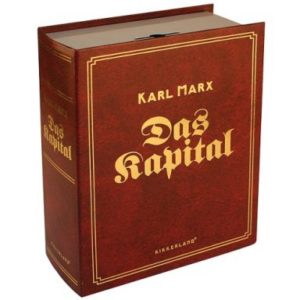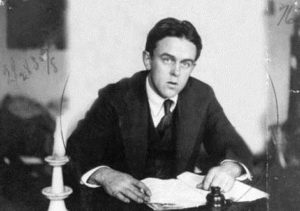 In the early years of radio, the BBC aired a series about famous exiles who lived in London. One episode included an interview with an elderly man long retired from his job in the British Museum’s reading room. The man was asked if he remembered a regular patron by the name of Karl Marx, who for many years toiled at the museum on what would become his masterpiece: Das Kapital. At first the retiree drew a blank, but after he was given several clues—Marx sat in the same seat every day, wore a thick greying beard, endured painful carbuncles, and endlessly requested materials about political economy—his memory came alive. “Oh Mr. Marx, yes, to be sure. Gave us a lot of work ’e did, with all ’is calls for books and papers. And then one day ’e just stopped coming. And you know what’s a funny fing, sir? Nobody’s ever ’eard of ’im since!” [1]
In the early years of radio, the BBC aired a series about famous exiles who lived in London. One episode included an interview with an elderly man long retired from his job in the British Museum’s reading room. The man was asked if he remembered a regular patron by the name of Karl Marx, who for many years toiled at the museum on what would become his masterpiece: Das Kapital. At first the retiree drew a blank, but after he was given several clues—Marx sat in the same seat every day, wore a thick greying beard, endured painful carbuncles, and endlessly requested materials about political economy—his memory came alive. “Oh Mr. Marx, yes, to be sure. Gave us a lot of work ’e did, with all ’is calls for books and papers. And then one day ’e just stopped coming. And you know what’s a funny fing, sir? Nobody’s ever ’eard of ’im since!” [1]
Notwithstanding the tremendous irony of the British Museum worker’s ignorance to the fact that the man for whom he retrieved books all those years ago had since become arguably the world’s most famous philosopher, Marx himself half expected Das Kapital to tumble into oblivion. As Marx was preparing to send his magnum opus to press in 1867, he suggested that his longtime friend and collaborator Friedrich Engels read The Unknown Masterpiece by Balzac. This was a sardonic recommendation. The Unknown Masterpiece was a short story about a painter who, in an effort to render a perfectly accurate representation of reality, spent decades laboring on a single painting. When a fellow artist scorned the piece as unintelligible mush, the painter hastily destroyed it in a blaze of fire, perishing himself shortly thereafter. [2]
Marshall Berman, the twentieth-century American philosopher who borrowed a famous line from The Communist Manifesto as the title of his pioneering 1982 book about modernity—All That Is Solid Melts into Air—submitted that there was poetry in Marx’s satirical analogy. Just as Balzac’s painter’s aborted attempt at realism anticipated the abstract expressionism of modern art, Marx’s infuriatingly complex and often disjointed attempt in Das Kapital to unmask the realities of capitalism was more befitting later times. In Berman’s words, “where one age sees only chaos and incoherence, a later or more modern age may discover meaning and beauty.” [3]
Against the grain of Marx’s cautious expectations, his masterpiece was not doomed to oblivion. Das Kapital unfolded the workings of capitalism in such profound fashion that people across the planet have been reading it ever since the late nineteenth century—the Gilded Age—when Marx’s theory that capitalism was a system that pitted capital against labor seemed to have revealed itself as the truth. Marx’s fate, in this way, has been tied to the fate of capitalism.
I posit that this is also true of several other Marxist masterpieces–books that have become almost timeless in their seeming growing relevance. As I have argued here before, this is certainly true of W.E.B. Du Bois’s amazing book Black Reconstruction in America.
Another book that fits this pattern, oddly, is John Reed’s Ten Days that Shook the World.
 John Reed arrived in Petrograd at the dawn of history. The globetrotting journalist had traveled to Russia with his feminist wife Louise Bryant as soon as news of impending revolution broke. It was 1917, and “Jack,” as his friends knew him, had a front-row seat to the October Revolution.
John Reed arrived in Petrograd at the dawn of history. The globetrotting journalist had traveled to Russia with his feminist wife Louise Bryant as soon as news of impending revolution broke. It was 1917, and “Jack,” as his friends knew him, had a front-row seat to the October Revolution.
Famous for his vivid first-hand accounts of labor conflict and war, Reed was the perfect writer to tell the electrifying story of Lenin and the Bolsheviks seizing power. Ten Days, Reed’s celebratory account of the Russian Revolution, is now hailed as an American classic. George Kennan of all people praised it as “a reflection of blazing honesty and a purity of idealism.” But Reed’s “slice of intensified history,” as he called it, had trouble finding an audience at first. “Here by wide acknowledgement,” a Reed biographer wrote, “was a great American journalist, an eyewitness to the greatest story of the time, but not an editor outside the tiny radical press would give him an inch of space.” [4]
Only Max Eastman, who published the left wing little magazine The Masses, was willing to assign Reed to cover the Russian Revolution. But while Reed was in Russia, the U.S. government shut down The Masses. Reed and other writers had been editorializing against American entry into World War I, which was a violation of the 1917 Espionage Act. Not giving up easily, Eastman founded a new magazine, The Liberator, and published Reed’s essays on the revolution, but only after preempting the censors by toning down Reed’s incendiary rhetoric. To make matters worse, upon Reed’s homecoming in 1918 customs officials seized his trunk full of notes and materials on the revolution, delaying his book by several months. [5]
In the face of state suppression, the publishers and editors of the widely circulated papers that had previously published Reed’s essays—American Magazine, Collier’s
, Saturday Evening Post, Metropolitan Magazine—stayed silent. Whereas Ten Days earned Reed burial at the Kremlin Wall Necropolis, one of only two Americans to receive that honor (“Big” Bill Heywood was the other), Reed’s adoring take on the Russian Revolution also merited him the scorn of the American publishing world. Reed’s glowing evaluation of the “great Lenin,” “loved and revered as perhaps few leaders in history have been,” was held in high contempt by the mainstream intellectual culture that had once embraced the daring reporter. [6]
 In retrospect, Ten Days grew in stature across the twentieth century less for its relevance to American life (unlike, I would argue, Das Kapital and Black Reconstruction) and more because it was forbidden fruit. The idea of an American born into relative comfort–an American who had graduated from Harvard no less–dying for the cause of communist revolution, illustrates the Romance of American Communism (beautifully captured by Vivian Gornick in her marvelous book by that title). It certainly explains the wide appeal of Warren Beatty’s award-winning film Reds, about the life of John Reed (played by Beatty himself). (If you haven’t seen this film, do yourself a favor and watch it.)
In retrospect, Ten Days grew in stature across the twentieth century less for its relevance to American life (unlike, I would argue, Das Kapital and Black Reconstruction) and more because it was forbidden fruit. The idea of an American born into relative comfort–an American who had graduated from Harvard no less–dying for the cause of communist revolution, illustrates the Romance of American Communism (beautifully captured by Vivian Gornick in her marvelous book by that title). It certainly explains the wide appeal of Warren Beatty’s award-winning film Reds, about the life of John Reed (played by Beatty himself). (If you haven’t seen this film, do yourself a favor and watch it.)
Since it is the centennial year for the Bolshevik Revolution and Ten Days
, I am going to host a roundtable on Reed’s famous book later in the year (in October or November, depending on whether we honor the Julian or Gregorian calendar!) If you are interested in contributing, let me know. Contributions can range widely. I’m interested in close readings of Ten Days, or analyses of its reception. I’m also interested in more general refections on the Russian Revolution and its role in American intellectual history. I would also love a contribution or two about the film Reds. I would even entertain thoughts about how all of this might relate to weird contemporary US-Russia relations. These are just a few of many possible ideas.
I am also interested in hearing from readers below, in the comments, about other texts that have outlived the context of their production–especially but not limited to Marxist texts. Cheers. Andrew
Notes
[1] Christopher Hitchens, “The Revenge of Karl Marx,” The Atlantic (April 2009).
[2] Francis Wheen, Marx’s Das Kapital: A Biography (New York: Atlantic Monthly Press, 2006), 1-4.
[3] Marshall Berman, All That Is Solid Melts into Air: The Experience of Modernity (New York: Penguin Books, 1982). Marshall Berman, Adventures in Marxism (London: Verso, 2001), 34.
John Reed, Ten Days that Shook the World (New York: Boni & Liveright, Inc., 1919). John Stuart, The Education of John Reed (New York: International Publishers Co., Inc., 1955), 31.
[5] Max Eastman, Love and Revolution: My Journey Through an Epoch (New York: Random House, 1964), 69-78.
[6] Reed, Ten Days that Shook the World, 77.

4 Thoughts on this Post
S-USIH Comment Policy
We ask that those who participate in the discussions generated in the Comments section do so with the same decorum as they would in any other academic setting or context. Since the USIH bloggers write under our real names, we would prefer that our commenters also identify themselves by their real name. As our primary goal is to stimulate and engage in fruitful and productive discussion, ad hominem attacks (personal or professional), unnecessary insults, and/or mean-spiritedness have no place in the USIH Blog’s Comments section. Therefore, we reserve the right to remove any comments that contain any of the above and/or are not intended to further the discussion of the topic of the post. We welcome suggestions for corrections to any of our posts. As the official blog of the Society of US Intellectual History, we hope to foster a diverse community of scholars and readers who engage with one another in discussions of US intellectual history, broadly understood.
This comment is entirely tangential, but thanks so much for sharing the anecdote about the old library employee and Marx. I’d heard it long ago (on CBC Radio if memory serves) but since then never been able to find a citation for it. It had gotten to the point where I thought I’d imagined the whole thing, so I’m glad to have my sanity semi-confirmed.
That anecdote sounds apocrvaphyl for sure. I got it from the Hitchens review of Wheen in The Atlantic. Not sure where he got it.
Andrew–I suspect for my generation, and perhaps the one before me too, the American book which taught us most about Marx, the radical tradition from the French Revolution up to the Russian Revolution, and thinking about history as such was Edmund Wilson’s “To the Finland Station”. It is a whole education in itself, however limited(in theoretical terms) it may be. I would also mention Isaiah Berlin’s short biography of Marx, published at roughly the same time. In my own memory,Wilson’s book seems much the richer and wider ranging text of the two. Finally, the other great book of the 1930s that lasted to be learned from by Marxists and non-Marxists alike is CLR James’s “The Black Jacobins”. It was important particularly in the 1960s. I sometimes think that Marxism is most compelling as a way of capturing the drama and struggle of modern history, as articulated in terms of class struggle but not confined to those terms strictly speaking, since, in James’s case, Toussaint was as important a force for change as the race-as-class struggle.
“Marxism is most compelling as a way of capturing the drama and struggle of modern history.” So well put, Richard. I could not agree more! By the way, Wilson, Berlin, and CLR James will all find their way into my book. Thanks for the great comment.